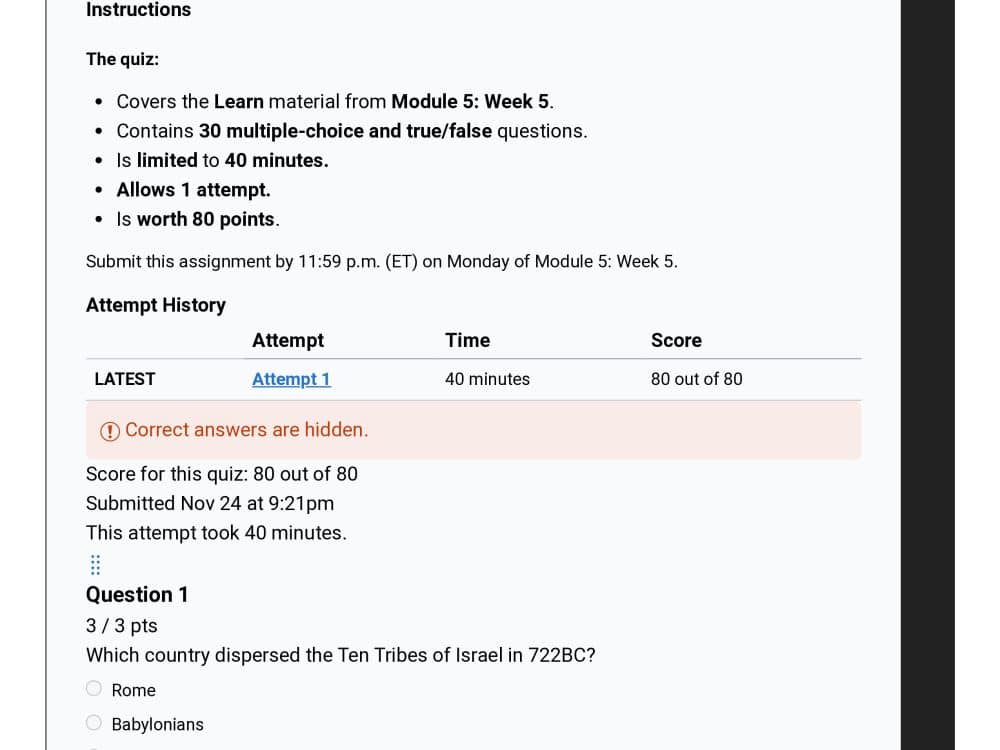
CSTU 101 Quiz 5 Rome and Christianity
CSTU 101 Quiz 5 Rome and Christianity
Covers the Learn material from Module 5: Week 5.
- Which country dispersed the Ten Tribes of Israel in 722BC?
- The Torah consists of the first five books of the Bible called the Pentateuch, which is also known as
- What word could be used in association with Christian Coptic Art?
- Who was the Latin-speaking Christian who mastered Greek and Hebrew, and produced a translation of the whole Bible known as the Vulgate?
- His interpretation of history quickly replaced those of classical thinkers and has remained influential to the present day. Lived (354-430).
- If the early Christians had worshiped Jesus and Caesar, they would have gone unharmed, but they rejected all forms of
- According to your textbook, what was the basic strength of the Jews? It gave them a will to resist and to survive.
- This Scripture used by modern Christianity is remarkably consistent. It was written over a period of 1,500 years, by at least ______ different writers and yet remains true to one theme and has a unified viewpoint on both philosophy and facts.
- According to your textbook, what was the most significant development in the cultural life of the Roman Empire?
- Who was the Bishop in (339-397) who successfully challenged and limited imperial authority over the church?
- The rise of Rome caused a shift from the Greek view of the individual as the ultimate reality to one in which reality was the
- Approximately what year did Constantine declare Christianity a legal religion of Rome?
- Who was the author of “The City of God”?
- The crucifixion of Christ occurred in approximately what year? CE (secular) /AD (Christian)
- The first ecumenical or world council, attended by 220 bishops in 325, formalized a
- One event not depicted in the catacombs was:
- During the time of Nero, there was the first recorded persecution of Christians that took place after a terrible destruction in the city of Rome in what year?
- In the Sarcophagus of Junius Bassus, which two figures are standing on either side of Jesus?
- Constantine played an influential role in the proclamation of the _____________, which decreed tolerance for Christianity in the empire.
- Who wrote The Wealth of Nations?
- The Dead Sea Scrolls found in 1947, outside of Jerusalem were old but very inaccurate.
- As we learned in the presentation “Introduction to Rome and Christianity,” the National Gallery of Art Museum resembles the Parthenon in Greece.
- Rome showed special originality in the eld of education by creating law schools and recognizing medicine as an important specialization.
- The Ceasars would not tolerate the Christians worshipping of the one God only.
- Pompeii was one of the only provinces of Rome that did not get caught up in all of the sexual representation.
- By the 5th century the Bishop of Rome was calling himself the Pope (Lat., papa, “father”) Christ’s vicar on earth.
- Because of all of the writings by Jesus, we know much about his life.
- The Apostles’ Creed covers the requirements for Church attendance.
- For centuries the Romans had constructed basilicas that served as meeting halls, mercantile centers, and halls of justice. The basilica was a prototype of the large, dignied structure Christians needed for worship services.
- The Bible is very specific in saying that Capitalism is the best form of economics.